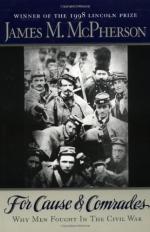
|
| Name: _________________________ | Period: ___________________ |
This quiz consists of 5 multiple choice and 5 short answer questions through Chapter 4, If I Flinched, I Was Ruined.
Multiple Choice Questions
1. After the story from the soldier who experienced the glaze of war during the battle at Gaines Mill, McPherson notes that another term for this phenomenon is what?
(a) Battle craze.
(b) Military insanity.
(c) Combat narcosis.
(d) Enraged glory.
2. When discussing various war memoirs, McPherson mentions that John Haley of Maine wrote which of the following?
(a) Hard Marching Every Day.
(b) On the Altar of Freedom.
(c) Hard Tack and Coffee.
(d) The Rebel Yell and the Yankee Hurrah.
3. As McPherson discusses the initial impulse that prompted men to enlist on both sides after the raid on Fort Sumter he references which of the following French terms?
(a) Folie.
(b) Vide en haut.
(c) Combattre pret.
(d) Rage militaire.
4. As "Chapter 2: We Were in Earnest" opens, McPherson says that another name for the Civil War is what?
(a) The Confederate War.
(b) The Union War.
(c) The Slavery War.
(d) The Brothers' War.
5. In the story of James and John Welsh, McPherson says that John--who enlisted with the 27th Virginia--was killed during which of the following battles?
(a) Chancellorville.
(b) Gettysburg.
(c) Bull Run.
(d) Shiloh.
Short Answer Questions
1. When discussing Southern motives for fighting, McPherson mentions a farmer in the 26th Tennessee who said that all BUT WHICH of the following were at stake?
2. How many children does McPherson report that Jesse Beecher had when he enlisted with the 112th New York in 1862?
3. When discussing the movie "Gettysburg" and the novel "The Killer Angels," McPherson mentions which man who won the medal of honor for defending Little Big Top?
4. McPherson quotes a sergeant who had spent the first twenty months of service guarding railroad bridges, as being disgusted with the lack of action. Which state was he from?
5. When comparing the American Patriots of 1776 to the "Southern Patriots" of 1861, McPherson notes that a famous quote by which of the following was a favorite Southern cry?
|
This section contains 323 words (approx. 2 pages at 300 words per page) |

|




